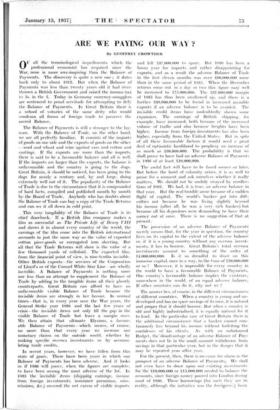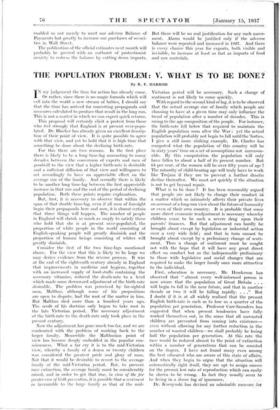ARE WE PAYING OUR WAY ?
By GEOFFREY CROWTHER
The Balance of Payments is still a stranger to the lay- man. With the Balance of Trade, on the other hand, we are all perfectly familiar. It consists of the -imports of goods on one side and the exports of goods on the other —wool and wheat and wine against cars and cotton and castings. If the exports are more than the imports, . there is said to be a favourable balance and all is well. If the imports are larger than the exports, the balance is unfavourable. and the country is going to the dogs. Great Britain, it should be noticed, has been going to the dogs for nearly a century and, by and large. doing extremely well out of it. The popularity of the Balance of Trade is.due to the circumstance that it is compounded of hard facts, compiled .and published month by month by the Board of Trade. Anybody who has doubts about the Balance of Trade can buy a copy of the Trade Returns and can see it all down in cold print.
This very. tangibility of the Balance of Trade is its chief drawback..! If a. British film company makes a film as. successful as .:The Private Life of Henry VIII and shows it in almost every country of the world, the earnings of the film come into the British international accounts in just the same way as the value of exported cotton piece-goods- or corrugated iron sheeting. But all- that the Trade Returns will show is the value of a few thousand yards of celluloid.. The exported film. from the financial point of view, is nine-tenths invisible. Other British exports—the services of the Corporation of Lloyd's. or of the Cunard White Star Line—arc wholly invisible. A Balance of Payments is nothing more nor less than an attempt to supplement the Balance of Trade by adding.to the, tangible items all their ghostly counterparts. Great Britain can afford to have an unfavourable visible Balance of Trade because the invisible items are strongly in her - favour. In -normal times—that is, in every year save the War years, the General Strike year 1926 and the last few years of erisis—the invisible items not only fill the gap in the visible Balance of Trade but leave a margin over. We then attain -that ultimate Elysium, a favour- able Balance of Payments—which means, of course, no more than that every year we increase our monetary claims on the outside world, whether by making specific -oversea investments or by accumu- lating- trade credits.
In recent years, however, we have fallen from this state of grace. There have been years in which our Balance of Payinents has- been adverse. And it looks as if 1936 will prove,- when the figures are complete, to have been among the MOst adVerse of 'the lot. In 1985- the ' invisible - items (shippiiig earnings, income from foreign investment's; insurance premiums,
com-
missions, &c.) covered-Abe net excess of visible imports and left £87,000,000 to spare. But 1936 has been a boom year for imports and rather disappointing for exports, and as a result the adverse Balance of Trade - in the first eleven months was over £68,000,000 more than in the same period of 1935. When the December returns come out in a day or two this figure may well he increased to £75,000,000. The £37,000,000 margin of 1935 has thus been swallowed up, and there is a further £38,000,000 to be found in increased invisible exports if an adverse balance is to be avoided. The invisible credit items have undoubtedly shown some expansion. The earnings of British shipping, for example, have increased, both because of the increased volume of traffic and also because freights have been higher. Income from foreign investments has also . been higher, especially from the United States. But in spite of all- these favourable factors it would need a great deal of optimistic hardihood to prophesy an increase of as much as 188,000,000. The probability is that we shall prove to have had an adverse Balance of Payments in 1936 of at least £10,000,000.
The awful fact will have to be faced sooner or later. But before the howl of calamity arises, it is as well to pause for a moment and ask ourselves whether it really matters. We should not be unduly swayed by recollec- tions of 1931. We had, it is true, an adverse balance in that year. But the real trouble arose because -of a sudden flight of capital. The world's banker got. into diffi- culties not because he was living slightly beyond his income (after all, he was a very rich banker) but because all his depositors were demanding to have their money out at once. There is no suggestion of that at present.
The possession of an adverse Balance of Payments merely means that, for the year in question, the country lives on its capital to the extent of the adverse balance or, if it is a young country without. any oversea invest- ments, it has to borrow. Great Britain's total oversea investments amount to something of the order of £4,000,000,000. Is it so dreadful to draw on this immense capital, once in a way, to the tune of £10,000,000 or so ? Moreover, it is impossible for every country in the world to have a favourable Balance of Payments. One country's favourable balance implies the existence, somewhere in the world, of an equal adverse balance. If other countries can do it, why not. we ?
The answer lies, of course, in the different; circumstances of different countries. When a country is young and un- developed and has no spare savings of its own, it is natural and proper that-it should borrow. But when a count ry is old and highly industrialised, it is equally natural for it to lend. In the particular case of Great Britain there is the additional circumstance that a banker cannot con- tinuously live beyond his income without forfeiting the confidence of his clients. As with an unbalanced Budget, the disadvantage of an adverse Balance of Pay- ments does not lie in the small amount withdrawn from savings in that particular year, but in the danger that it may be repeated year after year.
For the present, then, there is no cause for alarm in the prospect of an adverse Balance of Payments. We shall not even have to draw upon our existing investments for the £10,600,000 or £15,000,000 needed to balance the accounts, since foreign money poured into London during Most of 1936. These borrowings (for such they are in reality, although the initiative was the foreigner;') have enabled us not merely to meet our adverse Balance of Payments but greatly to increase -our purchases of securi- ties in Wall Street.
The publication of the official estimates next month will probably be greeted with an outburst of protectionist anxiety to redress the balance by cutting down imports. But there will be no real justification for any such move- ment. Alarm would be justified only if the adverse balance were-repeated and increased in 1937. And there is every chance this year for exports, both 'visible and invisible, to increase at least as fast as imports of food and raw materials.











































 Previous page
Previous page